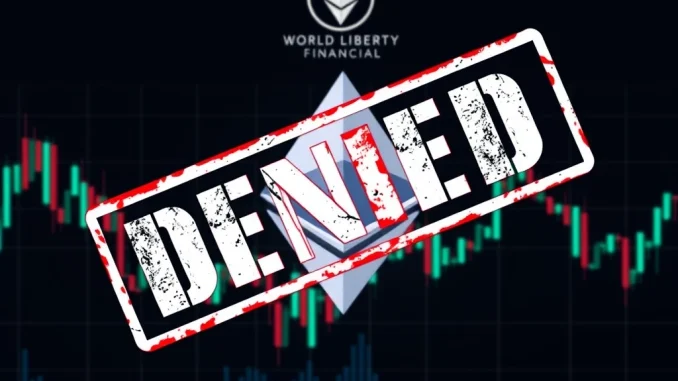
In a dramatic turn of events, World Liberty Financial (WLFI), the crypto platform linked to former President Trump, is fiercely pushing back against allegations of a significant ETH sell-off. Reports surfaced, fueled by data from Arkham Intelligence, suggesting a wallet associated with WLFI moved a substantial 5,471 ETH, valued at approximately $8 million, during recent turbulent market conditions. But WLFI isn’t backing down, labeling these reports as “wholly inaccurate” and emphatically stating they haven’t liquidated any of their crypto holdings. Let’s dive into this developing story and unpack what it means for WLFI and the wider crypto sphere.
Why is World Liberty Financial Refuting These ETH Sell-Off Claims?
The core of the controversy lies in the data presented by Arkham Intelligence. According to reports, Arkham identified a wallet they deemed “closely tied” to World Liberty Financial, though crucially, not definitively confirmed. This data indicated a movement of 5,471 ETH. However, WLFI has come out swinging, issuing a strong denial. Their stance is clear: they did not sell any ETH. This raises several critical questions:
- Is it a case of misidentification? Could Arkham Intelligence have incorrectly linked the wallet to WLFI? Attribution in blockchain analysis can be complex, and while sophisticated, these tools are not infallible.
- Is there another explanation for the wallet activity? Perhaps the ETH movement was for internal transfers, staking, or other operational reasons unrelated to a sell-off.
- What are the reputational stakes for WLFI? Being accused of a large sell-off, especially during market dips, can damage investor confidence and trust in a crypto platform, particularly one with high-profile affiliations.
WLFI’s swift and firm denial suggests they understand the potential damage these claims could inflict. For a platform aiming to establish itself in the competitive crypto landscape, maintaining a clean and trustworthy image is paramount.
Understanding the Alleged ETH Sell-Off and Market Volatility Context
The timing of these sell-off allegations is particularly sensitive given the recent volatility in the cryptocurrency market. Significant price swings can trigger panic selling or strategic repositioning by investors and platforms alike. Here’s why the market context is crucial:
- Market Sentiment: During periods of volatility, news of large sell-offs can exacerbate negative market sentiment, potentially leading to further price drops.
- Investor Confidence: Investors are particularly watchful during volatile times. Rumors or reports of platforms selling off assets can erode confidence and trigger withdrawals.
- Strategic Moves vs. Panic: Distinguishing between a strategic sell-off (e.g., rebalancing portfolios) and panic selling is important. In WLFI’s case, they are asserting it was neither, as they claim no sell-off occurred at all.
If WLFI had sold ETH, the timing would have certainly drawn scrutiny. However, their denial shifts the focus to the accuracy of the initial reports and the methodology of on-chain data analysis.
The Role of a Crypto Platform Like WLFI in the Current Landscape
World Liberty Financial, as a crypto platform, operates within a dynamic and often scrutinized industry. Platforms like WLFI play a crucial role in the crypto ecosystem, offering users access to digital assets and various financial services. Here are some key aspects of their role and the implications of these allegations:
- Custody and Security: Crypto platforms are custodians of user assets. Allegations of unauthorized or misrepresented asset movements raise concerns about security and transparency.
- Market Liquidity: Large platforms contribute to market liquidity. Significant sell-offs, whether real or perceived, can impact market depth and price stability.
- Regulatory Scrutiny: Crypto platforms are increasingly facing regulatory attention. Incidents like alleged undisclosed sell-offs can attract unwanted scrutiny from regulators.
- User Trust: Ultimately, the success of a crypto platform hinges on user trust. Accusations, even if later proven false, can damage this trust and impact user acquisition and retention.
For WLFI, navigating these challenges while maintaining user confidence is paramount. Their strong denial of the ETH sell-off suggests they are taking these reputational risks seriously.
Arkham Intelligence and the Data: What’s the Real Story Behind the ETH Sell-Off Report?
Arkham Intelligence is a well-known blockchain analytics firm that provides data and insights into cryptocurrency transactions. Their data was the basis for the initial reports of the ETH sell-off linked to WLFI. However, it’s essential to understand the nuances of on-chain analysis:
- Wallet Labeling: Arkham labeled the wallet as “closely tied” to WLFI. This labeling is often based on transaction patterns, known entity associations, and other on-chain heuristics. It’s not always a definitive confirmation of ownership.
- Data Interpretation: Blockchain data is public but requires interpretation. Identifying the purpose behind specific transactions can be challenging, and assumptions are sometimes made based on patterns.
- Potential for Error: While sophisticated, blockchain analytics tools are not error-proof. Misattributions or misinterpretations can occur, especially when dealing with complex wallet structures and anonymization techniques.
The key phrase from the Decrypt report, citing Arkham, is “closely tied” but “not confirmed.” This distinction is crucial. It highlights that the link between the wallet and WLFI was based on analysis and inference, not absolute proof. WLFI is likely capitalizing on this lack of definitive confirmation to refute the claims.
Navigating Market Volatility and Maintaining Transparency: WLFI’s Stance
Market volatility is an inherent characteristic of the cryptocurrency space. Platforms and investors must navigate these fluctuations strategically. WLFI’s denial of the ETH sell-off can be viewed in this context:
- Maintaining Calm: By swiftly denying the reports, WLFI aims to reassure users and prevent panic or further negative speculation during a volatile market period.
- Upholding Transparency (or Claiming To): WLFI’s statement emphasizes their position of not selling holdings, projecting an image of stability and commitment to their stated investment strategy. Whether this aligns with complete transparency remains to be seen.
- Protecting Reputation: In a volatile market, reputational damage can be particularly costly. WLFI is actively working to protect its image and credibility by challenging the sell-off narrative.
However, the situation also underscores the need for all crypto platforms to prioritize transparency and clear communication, especially during times of market stress. While WLFI denies the ETH sell-off, the incident serves as a reminder of the scrutiny and rapid information dissemination that characterize the crypto world.
What’s Next for World Liberty Financial and the ETH Sell-Off Controversy?
The immediate future likely holds further scrutiny and potentially more information coming to light. Here are some key aspects to watch:
- Arkham Intelligence’s Response: Will Arkham Intelligence stand by their data, provide further clarification, or retract their initial assessment of the wallet’s connection to WLFI?
- WLFI’s Further Actions: Will WLFI provide more detailed proof to back up their denial? Will they offer greater transparency into their wallet management and asset holdings?
- Media and Community Scrutiny: The crypto media and online communities will likely continue to investigate and discuss this situation, potentially uncovering more details or perspectives.
- Impact on WLFI’s Reputation: The long-term impact on WLFI’s reputation will depend on how this situation unfolds and how effectively they manage communication and transparency moving forward.
In conclusion, the World Liberty Financial denial of the ETH sell-off allegations presents a compelling case of conflicting narratives in the crypto world. While Arkham Intelligence data suggested a link and a significant ETH movement, WLFI vehemently refutes these claims. The situation highlights the complexities of on-chain data analysis, the importance of platform transparency, and the ever-present volatility of the crypto market. As this story develops, the crypto community will be keenly watching to see which narrative ultimately prevails and what lessons can be learned about data, trust, and accountability in the decentralized finance space.



